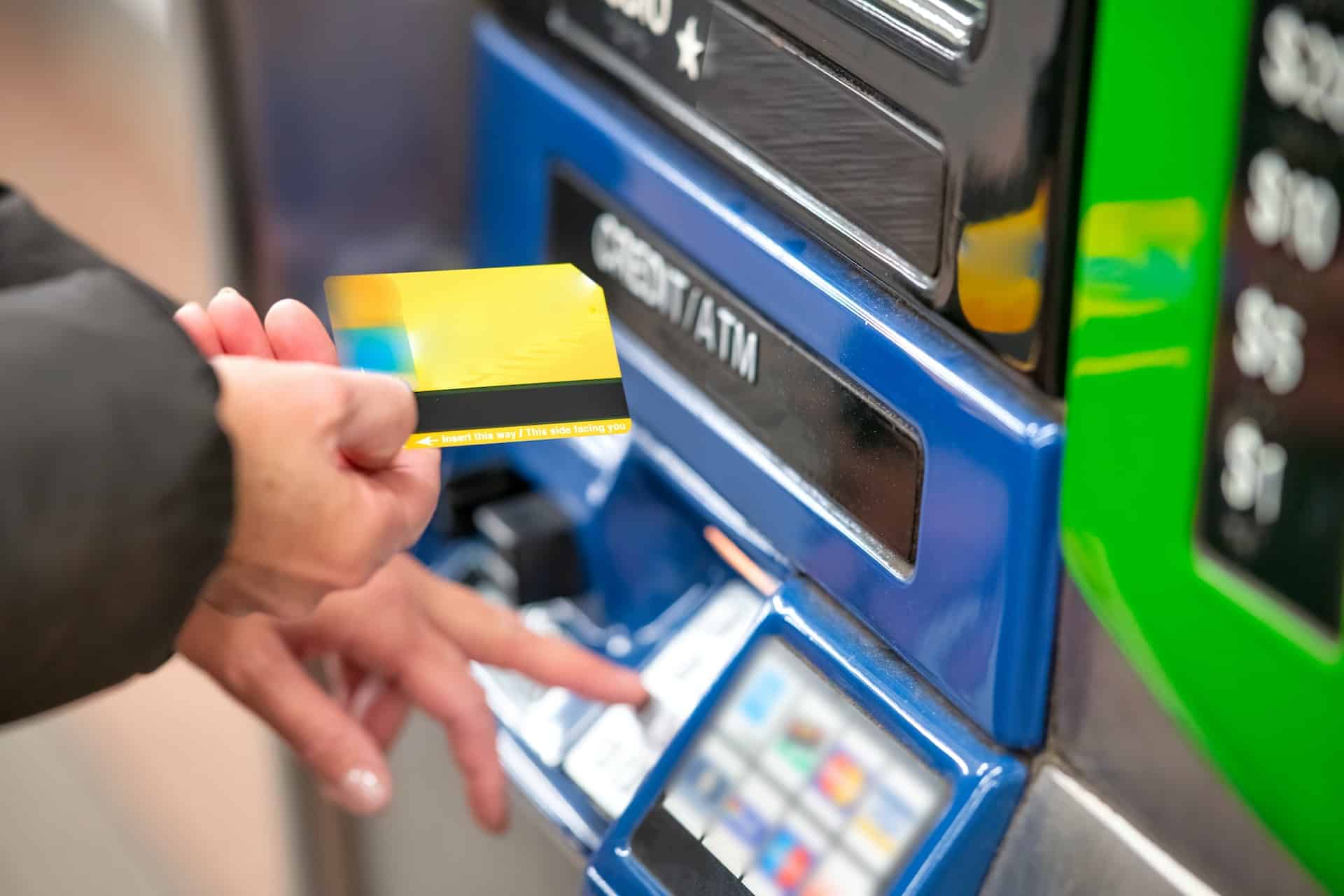Key Takeaways
- Some credit cards come with PINs, although most everyday purchases do not require one. PINs are mainly used for cash advances or certain international transactions.
- Whether your card uses a PIN depends on the issuer and how the card is being used. Cards in many countries work with a Chip-and-PIN system, while cards in the United States more commonly use Chip-and-Signature or contactless payments.
- A PIN adds an extra layer of security by confirming your identity and helping prevent fraud. If you do not have a PIN or you’ve forgotten it, you can usually create or reset one through your online banking account, your mobile app, an ATM, or by contacting your card issuer.
- To keep your PIN safe, choose a number that is not easy to guess, never share it with others, and shield the keypad whenever you enter it to protect against theft or misuse.
Do credit cards have PINs? Typically, you won’t have to use a PIN to make a standard credit card transaction. However, some issuers may require use of a PIN if the card holder is attempting to use their card overseas or when requesting cash advances.
If you have a checking account and debit card, you are no doubt familiar with PINs, but what many people don’t know is that credit cards can have PINS too. However, while some credit card issuers require account owners to have PINs, many do not.
Here, you will learn about chips and PINs, as well as other personal finance security features that can come with credit cards.
What Is a PIN Number?
A personal identification number, also referred to as a PIN, is a four-digit code assigned to an account owner for most debit cards and some credit cards. Most people are able to choose their PINs, while others receive a PIN that was assigned to them by their bank or credit card company.
Why Are PINs Important?
What is the purpose of a personal identification number? PINs essentially represent an account owner’s signature and serves as verification of their identity when making purchases and transactions. In other words, PINs ensure that only the owner of a bank account or credit card is able to make purchases using the account.
Some cards also have a chip on the physical card that allows consumers to bypass entering their PIN or other account information when making purchases.
Essential Insights on Credit Card PIN Usage and Security
| Aspect | Details | Consumer Benefits |
| PIN Usage in Different Countries | Varies significantly; some countries rely heavily on PINs, while others use signature verification. | Helps in preparing for international travel with a credit card. |
| Contactless Payment Limits | Many credit cards allow contactless payments without a PIN, but there’s often a transaction limit. | Facilitates quick, small transactions without needing a PIN. |
| Online Transactions Security | Online purchases usually don’t require a PIN but may use other forms of verification like OTPs. | Ensures secure online shopping without the need for a PIN. |
| PIN Recovery Process | Procedures vary by issuer; some allow online recovery, while others require a phone call. | Provides a clear path to regain access if PIN is forgotten. |
| Impact of PIN on Interest Rates | PIN usage or setup does not directly affect interest rates on credit cards. | Assures that PIN management has no financial cost implications. |
| Credit Card Locking Features | Many issuers offer temporary card locking/unlocking via apps, useful if a PIN is compromised. | Enhances security, allowing immediate response to suspected fraud. |
| PIN vs. Signature Preference | Some merchants may prefer PIN over signature or vice versa, depending on their policy. | Prepares consumers for different merchant preferences. |
| Chip-and-PIN vs. Chip-and-Signature | Chip-and-PIN is common in Europe, while Chip-and-Signature is more prevalent in the U.S. | Informs about the prevalent technology in different regions. |
| Fraud Liability with PIN Transactions | Generally, consumers have lower liability for fraud in PIN-based transactions compared to signatures. | Provides an added layer of security and reduced risk in case of fraud. |
| Changing PIN at ATMs | Some banks allow changing your credit card PIN directly at their ATMs. | Offers a convenient and immediate way to update a PIN. |
Can I Change Credit Card PINs and Debit Card PINs?
Need a new PIN? Fortunately, credit card and debit card PINs are not set in stone. If you forgot your PIN or just want to change it, you can easily do so by contacting your bank or credit card provider. You may be able to change your debit or credit card’s PIN over a quick phone call or online interaction.
Credit Card PIN vs. Debit Card PIN
While they share many similarities, there is a difference between credit cards vs. debit cards, as well as a credit card PIN and a debit card PIN. According to the American Bankers Association, approximately 73% of families have at least one credit card.1 This is slightly less than the amount of Americans who have a debit card, which is about 83%.2
Debit cards are issued by banks and allow account holders to make purchases electronically using the funds in their checking or savings accounts. Debit card pins are also a four-digit code, but they are much more commonly used than credit card pins. Some vendors require buyers to enter their debit card PIN with each individual purchase, and others only require a PIN for purchases of $25 or more.
Do You Need a PIN To Make Regular Credit Card Transactions?
Credit cards are revolving lines of credit where borrowers spend money using their available credit limit instead of the funds in their bank account. Typically, borrowers do not need to enter a PIN in order to make standard credit card purchases or online transactions.
Since credit cards do not withdraw money directly from the borrower’s bank account, there is an added layer of security when account holders make purchases. If someone makes a fraudulent transaction with a credit card, the account holder has a chance to dispute the transaction before any money leaves their actual bank account. Due to this added security, credit cards do not typically require account owners to enter their PIN every time they make a purchase using their credit card.
When Credit Card Issuers May Require a PIN
While consumers usually do not need to enter a PIN when using their credit cards, certain purchases or transactions may require a credit card holder to enter a PIN.
Credit Card Cash Advances
Depending on where you go and how much you withdraw, some credit cards may require a PIN in order to perform cash advances. A credit card cash advance is a way for consumers to use their available credit limit in order to obtain physical cash. You can get a credit card cash advance online or directly from an ATM.
Usage Outside the United States
Many credit card companies require borrowers to enter their PIN when making purchases in a foreign country. Making purchases in foreign countries may also come with other requirements, like foreign transaction fees.
Travelers may be able to bypass this security feature by contacting their credit card company and informing them of their intent to travel outside of the United States. If your credit card issuer expects incoming purchases from outside of the U.S., they may not require you to enter your PIN.
How To Get a Credit Card PIN
If your credit card does not have a PIN, you may have to set one up. You can get your own PIN by:
- Checking your online account.
- Using your credit card issuer’s mobile app.
- Contacting your credit card company directly.
Check Your Online Credit Card Account
You may be able to access your credit card PIN online. Simply sign into your online account and search for your account details. There you should be able to view your full credit card number, security codes, expiration dates, and your PIN.
Use Your Credit Card Issuer’s Mobile App
If your credit card company has a mobile app, that may be a more reliable option than checking your credit card PIN online. Mobile apps often have an extra layer of security to keep your information encrypted. Similarly to accessing your PIN on a website, log in and view your account information. If you do not see a PIN listed, you may be able to request one directly from the mobile app.
Try an ATM
While you may not be able to request a PIN via an ATM, you can confirm if your credit card account currently has one. You should be able to view all your account information at most ATMs, which includes your PIN.
Contact Your Credit Card Provider Directly
For more efficient service, you may want to contact your credit card company directly.
Email Your Card Issuer
You can email your provider and inform them you want to request a PIN. From there, you should receive a response from an agent with all the information you need on the credit card issuer’s policy on PINs.
Visit Your Card Issuer in Person
Another option is to visit your bank or credit card provider in person. You can call and set up a meeting or visit a brick-and-mortar store during business hours to discuss your account.
Tips for Keeping Your PIN Safe
Once you have a PIN, it is important to keep it safe and secure. If somebody with ill intentions gets ahold of your PIN, they may be able to make debit or credit card purchases in your name without your consent! Below are a few tips on how you can keep your PIN out of harm’s way.
Don’t Pick a Basic PIN
While you want to be able to easily remember your PIN, avoid choosing a four-digit combo that is easily recognizable to anybody. For example, selecting 1, 2, 3, 4, or the year you were born would not be wise PIN choices. Instead, pick four random numbers or numbers that only you recognize the significance of.
Keep Your PIN Private
Do not tell anybody, not even close friends or family members, what your PIN is. Don’t discuss your PIN over email, texting, phone calls, or even in person. If you tell one or more people what your PIN is, you run the risk of leaking your information to someone who may want to abuse it.
Enter Your PIN Subtly
When you are entering your PIN at a store or ATM, do so inconspicuously. Angle your body in front of the keypad or cover it with your hand to prevent unwanted eyes from seeing you enter your PIN. This is a simple but effective way to make sure that people within your close proximity will not steal your PIN.
What To Do if Your Credit Card Company Does Not Allow PINs
Not all credit card companies issue PINs. If your particular issuer does not issue PINs, you can feel free to go about making purchases without one. You can also use the chip reader on your credit card if you want some extra security protection when you make credit transactions.
Other Ways To Get Money if You Don’t Have a Credit Card
Thankfully, credit cards and debit cards aren’t the only way people can access funding when they need it. Below are other options to consider when you need some quick cash.
- Personal loans – instead of a revolving line of credit, you may consider getting a personal installment loan to cover your financial needs. You can also consolidate debt with personal loans.
- Bank loans – borrowers who are in good credit standing may be able to access funding via a bank loan. If you have bad credit or have a history of bankruptcy, you are most likely better off going with another loan option.
- Payday loans – many people find themselves debating between a payday loan or a personal installment loan when they need fast cash. But, what a lot of borrowers don’t realize is that payday loans often leave borrowers in more debt. Unless you can pay back your entire balance within about fourteen days, you most likely won’t find a payday loan helpful.
- Credit union loans – credit unions are another financial institution offering loans, but only to its members. To become a member of a credit union, you will have to check with the union leaders to see what their eligibility requirements are.
FAQ: Credit Card PIN
Credit repair companies typically focus on improving your credit score and may not directly assist with credit card PIN issues. However, they can guide you on how to securely manage your credit card transactions to avoid negative impacts on your credit score.
No, your credit card PIN itself does not impact your credit score. However, secure use of your PIN during credit card transactions can prevent fraudulent activities that might harm your credit standing.
You should never share your credit card PIN with anyone, including credit repair companies. Keeping your PIN confidential is crucial for the security of your credit card transactions.
While there’s no set frequency, it’s a good practice to change your personal identification number periodically, especially if you suspect it may have been compromised.
While credit repair companies primarily focus on credit score improvement, they might provide general advice on financial security, including the importance of setting up a secure credit card PIN.
Immediately contact your credit card provider to report the suspicion and consider changing your PIN. Monitoring your account regularly is key to spotting unauthorized transactions.
Yes, many credit card purchases and transactions, especially in the U.S., do not require a PIN. However, a PIN may be necessary for certain types of transactions, like cash advances.
Choose a PIN that’s hard to guess and avoid obvious sequences or numbers related to your personal information, like birthdays or anniversaries.
Credit repair companies can assist in disputing fraudulent transactions and advise on steps to take to secure your account, but they do not directly handle PIN-related issues.
Yes, some countries rely more heavily on PINs for credit card purchases and transactions. It’s advisable to know your PIN and ensure it’s active before traveling internationally.
A Word From CreditNinja Regarding Credit Card PINs
Credit card PINs are usually not required for everyday purchases, so chances are you won’t have to worry about them at all. If you do find yourself in a situation where you need a credit card PIN, CreditNinja encourages you to contact your issuer to confirm if they issue PINs or not.
Check out more information about credit card PINs, organizing your budget, and other financial resource topics in the CreditNinja dojo!
References:
- Credit Card Facts and Tips | American Bankers Association
- Credit and Debit Card Market Share by Network and Issuer | The Motley Fool
- Request or Change PIN | Capital One Help Center
- How Do I Request a PIN For My Credit Card If I’ve Never Had One Before? | USBank
Sarah is a Digital Content Writer for CreditNinja with more than 8 years experience in writing about financial current events, a wide variety of lending products, credit scores, and more. Sarah is dedicated to informing inquiring readers about core financial topics. Currently, Sarah is a participant in the American Bankers Association® Frontline Compliance program and has certificates in over 20 courses. Sarah received her bachelor’s degree as an English major with a concentration in Creative Writing. She enjoys writing about finance education, spending time with her dog and cat, and reading in her spare time. Areas of Focus: Personal Finance Education, Financial Literacy, Editing, Copywriting, Epic Fantasy Books






